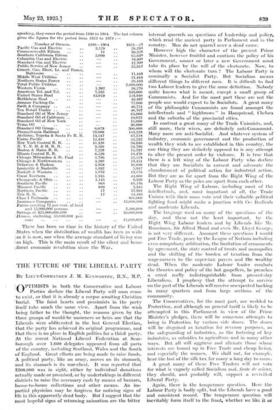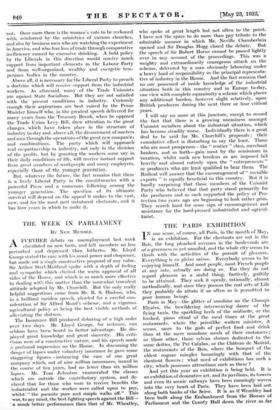THE FUTURE OF THE LIBERAL PARTY
BY LIEUT-COMMANDER J. M. KENWORTITY, R.N., M.P.
OPTIMISTS in both the Conservative and Labour Parties declare the Liberal Party will soon cease to exist, or that it is already a corpse awaiting Christian :burial. The faint hearts and pessimists in the party itself take much the same view. Apart from the wish being father to the thought, the reasons given by the three groups of would-be mourners or heirs are that the Liberals were obliterated in the last General Election, that the party has achieved its original programme, and that there is'no place in English politics for a third party. At the recent National Liberal Federation at Scar- borough over 1,000 delegates appeared from all parts of the country, including Scotland, Wales and the South of England. Great efforts are being made to raise funds. A political party, like an army, moves on its stomach, and its stomach is its war-chest. It was reported that £300,000 was in sight, either by individual donations actually made or promised, or by undertakings in different districts to raise the necessary cash by means of bazaars, house-to-house collections and other means. An im- partial physician may be forgiven for noticing signs of life in this apparently dead body. But I suggest that the most hopeful signs of returning animation are the bitter internal quarrels on questions of leadership and policy. which rend the ancient party in Parliament and in the country. Men do not quarrel over a dead cause.
However high the character of the present Prime Minister, however fruitful and cautious the policy of his Government, sooner or later a new Government must take its place by the will of the electorate. Now, to whom will the electorate turn ? The Labour Party is nominally a Socialist Party. But Socialism means different things to different men. It is difficult to find two Labour leaders to give the same definition. Nobody quite knows what is meant, except a small group of Communists. And for the most part these are not the people one would expect to be Socialists. A great many of the philosophic Communists are found amongst the intellectuals and " highbrows " in Hampstead, Chelsea and the suburbs of the provincial cities.
In contrast a great many of the Trade Unionists, and, still more, their wives, are definitely anti-Communist. Many more are anti-Socialist. And whatever system of industry, economic government and the production of wealth they wish to see established in this country, the one thing they are definitely opposed to is any attempt to alter the present order by violence. It is true that there is a left wing of the Labour Party who declare that they are Socialists in earnest and advocate the abandonment of political action for industrial action. But they are as far apart from the Right Wing of the Labour Party as the poles are apart from each other.
The Right Wing of Labour, including most of the intellectuals, and, most important of all, the Trade Unions with their mass vote and their valuable political fighting fund might make a junction with C.?, Radicals and moderate Liberals.
The language used on many of the questions of the day, and these not the least important, by the Right Wing Labour leaders and by Liberals like Mr. Runeiman, Sir Alfred Mond and even Mr. Lloyd George, is not very different. Amongst these questions I would put Free Trade, peace by the League of Nations including even compulsory arbitration, the limitation of armaments by agreement, the state control of trusts and monopolies and the shifting of the burden of taxation from the wage-earners to the super-tax payers and the wealthy dead. When the moderate Labour leader combats the theories and policy of the hot gospellers, he preaches a creed really - indistinguishable from present-day Liberalism. I prophesy that the attempt to survive on the part of the Liberals will receive unexpected backing in many quarters and from large sections of the community.
The Conservatives, for the most part, are wedded to Protection, and although no general tariff is likely to be attempted in this Parliament in view of the Prime Minister's pledges, there will be numerous attempts to bring in Protection by various side doors. The doors will be disguised as taxation for revenue purposes, as the safeguarding of industries, as the fostering of key industries, as subsidies to agriculture and in many other ways. But all will aggrieve and alienate those whose interests are bound up in Free Trade and cheap living, and especially the women. We shall not, for example, hear the last of the silk tax for many a long day to come. A great many of these Free Traders will not vote for what is vaguely called Socialism and, faute de micux, they should, and probably will, support a revivified Liberal Party.
Again, there is the temperance question. Ikre the Labour Party is badly split, but the Liberals have a good and consistent record. The temperance question will inevitably force itself to the front, whether we like it or not. Once more there is the woman's vote to be reckoned with, reinforced by the ministries of various churches, and also by business men who are watching the experinient in America, and who fear loss of trade through comparative inefficiency caused by excessive drinking. A bold policy by the Liberals in. this direction would receive much support from important elements in the Labour Party and from well-organized, wealthy and energetic tem- perance bodies in the country.
Above all, it is necessary for the Liberal Party to preach a doctrine which will receive support from the industrial workers. As aforesaid, many of the Trade Unionists are against State Socialism. But they are not satisfied with the present conditions in industry. Curiously enough their aspirations are best voiced by the Prime Minister himself who, in the greatest speech delivered for many years from the Treasury Bench, when he opposed the Trade Union Levy Bill, drew attention to the great changes which have taken place in the structure of industry to-day and, above all, the divorcement of masters and men through the operations of the great new cornpanie and combinations. The party which will approach real co-partnership in industry, not only in the division of the profits, but by granting the workers some say in their daily conditions of life, will receive instant support from great numbers of workpeople and many employers, especially those of the younger generation.
But, whatever the future, the fact remains that there is a lively Liberal Party in the constituencies with a poWerful Press and a numerous following among the younger generation. The question of its ultimate survival will depend on the appeal it makes to the vast, new, and for the most part untutored electorate, and it has four years in which to make it.











































 Previous page
Previous page